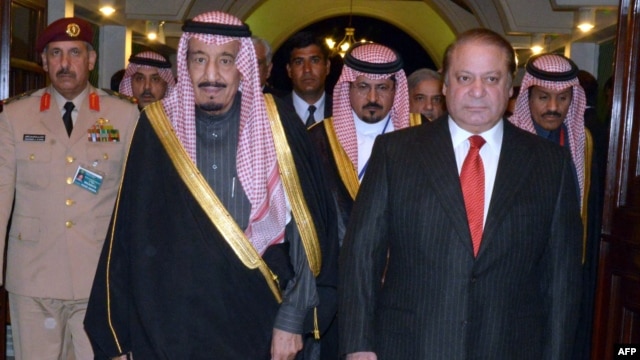Saudi-Pakistan Military Ties Getting Stronger
A handout photo released by the Press Information Department (PID) shows Pakistani Prime Minister Muhammad Nawaz Sharif (R) welcoming Saudi Crown Prince Salman bin Abdul Aziz Al- Saud at the Prime Minister’s House in Islamabad. Feb. 17, 2014 (AFP)
Kokab Farshori
February 19, 2014
WASHINGTON — Crown Prince Salman bin Abdulaziz, who is Saudi Arabia’s deputy prime minister and defense minister has just concluded an official visit to Pakistan. Some defense experts say that Saudi Arabia’s close military ties with Pakistan, though not new, now have a new dimension – namely countering the threat of a nuclear-capable Iran.Some security experts fear that one of the unintended consequences of international efforts to reach a nuclear deal with Iran could be to put its Gulf rival Saudi Arabia on a fast track to boost its own military capability in an unprecedented way.
Ali Sherazi is Pakistan’s former ambassador to Saudi Arabia, and speaking to VOA’s Deewa Radio he says Riyadh may fear a nuclear deal could end economic sanctions on Iran, enabling it to secretly pursue its ambitions.
“Iran is seeking to be a nuclear power and Saudi Arabia as a regional power, cannot ignore this, he said.”
With one of the largest armies in the world and the only declared nuclear power among the Muslim states, Pakistan is in a unique position to assist Saudi Arabia with its defense needs.
Sarfraz Khan, the chairman of the Area Study Center at the University of Peshawar, says Iran and Saudi Arabia have conflicting interests in the region and Pakistan can strengthen the Saudi position.
“To counter Iran’s influence, Saudi Arabia has often looked towards Pakistan’s help,” he told Deewa Radio.
Last year, the BBC reported that Saudi Arabia has invested in Pakistan’s nuclear weapons projects. Both Pakistan and Saudi Arabia denied the report.
But there is no denying that the military cooperation between the two countries is strong and getting stronger. The joint statement issued Monday at the end of Crown Prince Salman bin Abdulaziz visit says “The two sides also agreed on the need to enhance bilateral cooperation in the field of defense.”
This cooperation comes in many forms, including training of Saudi pilots by the Pakistan Air Force and the deployment of Pakistani troops to Saudi Arabia to provide security.
Nauman Wazir, a defense analyst and former air commodore of Pakistan’s Air Force, says now Pakistan may sell JF-17 Thunder combat jets and trainer aircraft to Saudi Arabia.
“For Saudi Arabia, there is no better aircraft than the JF-17 as a trainer and as a fighter plane. It has the capability to support the troops on the ground,” Wazir told Deewa.
But the two countries’ joint statement does not specify if the Saudis are interested in buying jets from Pakistan.
Ali Sherazi also says say Iran is not the only reason Saudi Arabia wants close military ties with Islamabad. They say Pakistan can also help the oil-rich kingdom combat the threat from al-Qaida and border incursions from neighboring Yemen.
“Al-Qaida is also seen as a threat in Saudi Arabia. On top of that the regional situation like the infiltration from Yemen is a factor and that makes the Saudi threat perception multi-dimensional,” Sherazi said.
Pakistan has its own disputes with Tehran largely focused on the tense border between Iran and Pakistan’s Balochistan province. Five Iranian border guards were seized recently by militants and taken across the border into Balochistan, prompting Iran to warn that it might send forces across the border to free them. Pakistan expressed “serious concern” over the remarks and tense ties with Iran are likely to push Islamabad and Riyadh closer together say analysts.
Pakistan’s Prime Minister Nawaz Sharif also enjoys exceptionally close ties with senior members of the Saudi royal family. When Sharif was toppled in a bloodless military coup in 1999, Saudi Arabia intervened and military chief, Pervez Musharraf allowed Sharif and his family to travel into exile in Saudi Arabia. Mehmood Shah, a former Pakistani army brigadier and senior official in Pakistan’s intelligence agency, the ISI says those close ties will only strengthen ties between Islamabad and Riyadh.
“During former President Zardari’s tenure relations with the Kingdom of Saudi Arabia were not really warm but as we know that PM Sharif has good relations with the Saudi ruling family and that further strengthens the bilateral ties,” Shah told Deewa.

No comments:
Post a Comment